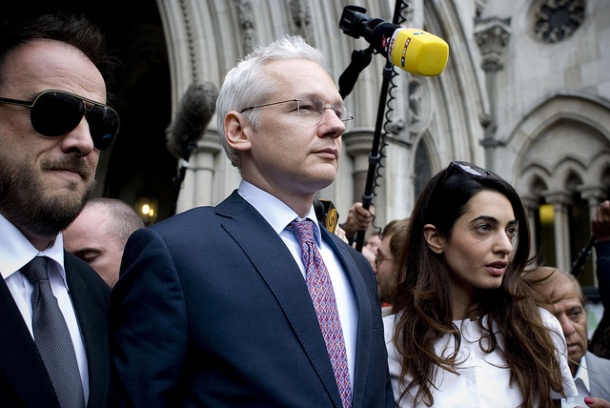Assange's Supreme Court extradition appeal kicks off

Wikileaks founder Julian Assange has begun his Supreme Court bid to avoid extradition to Sweden to face questioning about allegations of sexual coercion.

Wikileaks editor Julian Assange (pictured in July 2011) has begun his Supreme Court appeal against extradition to Sweden. Photo credit: acidpolly/Flickr
Assange appeared relaxed as the two-day hearing began in the Supreme Court building opposite the Houses of Parliament on Wednesday. The Supreme Court appeal is the Australian's last chance to convince UK authorities not to extradite him.
In court in London, Assange's lawyers began laying out their arguments to the group of seven law lords sitting in judgement. The basis for the appeal is that Swedish prosecutor Marianne Ny acted beyond her powers in ordering Assange's extradition under a European Arrest Warrant (EAW), meaning the High Court was wrong to recognise the EAW as valid.
Ny cannot act as 'judicial authority' for the purposes of issuing an EAW "because she lacks the impartiality and the independence from both the executive and the parties which constitute essential features of the exercise of judicial authority under domestic and European law," the lawyers said in a skeleton argument published as the hearing began.
In court, the defence team asked the judges to consider 15 volumes of legal findings to back up its arguments. Defence barrister Dinah Rose asked them to consider definitions of the phrase 'judicial authority' in a number of the documents, which do not describe prosecutors this way.
"The key point is the use of the term 'judicial authority'," Rose told the court.
Extradition push
The Swedish authorities, represented by the Crown Prosecution service in the hearing, want Assange to travel to Sweden to face questioning about allegations he had coercive sex with two women in August 2010.Some of the Wikileaks editor's backers have suggested the US government is influencing the Swedish government's extradition push, in an attempt to get Assange into its jurisdiction. Wikileaks embarrassed the US when it published hundreds of thousands of confidential US embassy documents last year.
Assange has been living in Suffolk on conditional bail since December 2010, when he was freed from detention for extradition by a High Court judge.
If Assange's Supreme Court appeal fails, he can apply to appeal to the European Court of Human Rights (ECHR) without delay, the Crown Prosecution Service said in December. The ECHR then has 14 days to respond. If the ECHR application to appeal is rejected, Assange would be extradited. If the application is accepted, Assange would not be extradited from the UK while the ECHR case continued.
Get the latest technology news and analysis, blogs and reviews delivered directly to your inbox with ZDNet UK's newsletters.